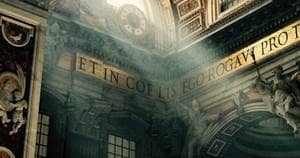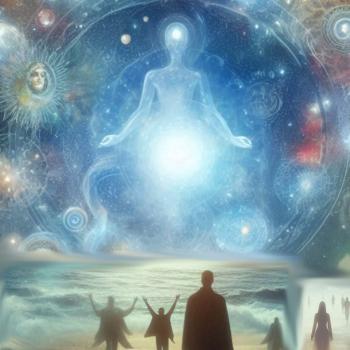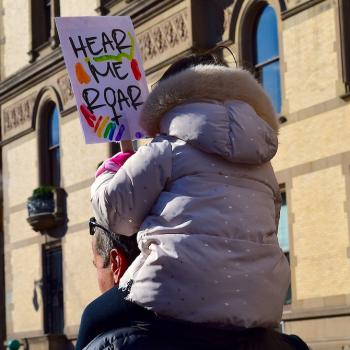
The diffusion of darkness into the holy place, aided in its incursions by human sin. This is the subject, as I reckon it, of Netflix’s Midnight Mass (dir. Mike Flanagan). O’Connor, another master of all things grotesque, identified her subject as ‘the action of grace in territory largely held by the devil’ (Mystery and Manners, 118).
Although Flanagan’s theme stands in obverse relation to that of O’Connor; his concern is the action of the devil in territory largely held by grace, which is a recurring biblical motif as well. I gleaned a lot out of pondering Midnight Mass; even something encountered while surfing a streaming site, it seems, can repay careful study. (Spoilers ahoy, by the way, for this article. It’s best read after your viewing.)
Set on the solitary Crockett Island, the show follows the life of a dwindling fishing community. With a declining population, the town’s fishing industry has begun to falter.
‘This isn’t a community anymore, honey; it’s a ghost,’ remarks a central character to her son. Those who continue to scrape out a living at sea lean on the Roman Catholic tradition to sustain their flagging spirits.
Latterly, the faithful of Crockett were under the care of an elderly priest, whose name was Monsignor John Pruitt. In Pruitt’s absence, the Monsignor being unwell in a hospital off-island, a vacancy has opened up in the local parish. And so, Father Paul Hill, whom the Diocese has appointed as temporary rector, disembarks on Crockett Island.
I promised you spoilers, and spoilers ye shall have!
In the very first episode, we see Father Paul dragging a huge, ominous-looking trunk into his new rectory. Turns out a powerful vampire is lurking in this trunk, which Paul smuggled onto the island as he believes its blood is endowed with miraculous powers. This he knows through bitter experience.
In another twist, it emerges Father Paul is really none other than the frail Monsignor, shorn of decades and young again.
On a pilgrimage in Jerusalem, the same vampire attacked a defenseless Monsignor Pruitt. And it restored his youth by shedding its own supernatural blood into his mouth as Pruitt was dying.
Now Pruitt is back on the island and is mixing paranormal vampire blood into the normal communion wine. Those who consume this concoction experience a release from their medical ailments. And it eventually transpires that anyone who dies having drunk some vampire blood is resuscitated shortly after death.
As the show builds towards a crescendo, Pruitt inveigles the town faithful into swallowing deadly poison to trigger the vampire blood’s resuscitating power.
In doing so, he turns the Blessed Sacrament into part of a suicide ritual. ‘Tonight is the beginning of a new era,’ the delusional Monsignor cries as the gruesome climax approaches.
So the vampire is the show’s monster. And it invades, in ever more insidious ways, the religious life of Crockett Island.
Saints Matthew and Mark speak, in their Gospels, of an ‘abomination of desolation’ (Mt. 24:15; Mk. 13:14), an unholy presence in the sanctified space. Daniel the Prophet was their inspiration for this image of a congregation under ungodly siege; ‘and they shall pollute the sanctuary of strength, and shall take away the daily sacrifice,’ the Prophet warns, ‘and they shall place the abomination that maketh desolate’ (11:31).
There is one scene in particular where Flanagan was possibly thinking about such a verse. Dressed in clerical robes, the vampire stands before the faithful in the island’s chapel, wings outspread, obscuring the altar behind it. Symbolically, then, the daily sacrifice — the Mass — has been abolished, as in the Prophet’s writings.
A good resource for approaching Midnight Mass is Christopher Booker’s The Seven Basic Plots (2004), the great work of English literary theory. Booker addresses the seven fundamental shapes a story can take, starting with ‘Overcoming the Monster.’
‘The realm of storytelling contains nothing stranger or more spectacular than this terrifying, life-threatening, seemingly all-powerful monster whom the hero must confront in a fight to the death’ (22). And when the vampire’s power overtakes the island, it will indeed refuse to go down without a reckoning. As the character who finally subdues the creature says to her allies in the fray, ‘It isn’t about us anymore. It’s about everyone else in the world,’ as in those who may suffer the vampire’s wrath if were to reach other towns.
An ‘Overcoming the Monster’ deals with a battle for non-extinction. ‘But the monster also often has in its clutches some great prize,’ Booker adds, ‘a priceless treasure or a beautiful Princess’ (23). The vampire baits its victims with a treasure of immortality. This comes at a high moral cost when they too cannot resist indulging in the creature’s bloodsucking ways. In a manner of speaking, the vampire does also have a beautiful Princess in its grip.
As chaos overtakes Crockett Island, with Pruitt’s vampire now rampaging around, snatching people in their houses, the Monsignor makes a confession. ‘I didn’t want you to die,’ Pruitt admits to his former love interest, a dementia sufferer. All he wanted was to reverse her decline.
But why do monsters capture our imagination?
Booker has an interesting answer; ‘in its oddly elusive way, we see this night creature,’ he surmises, ‘representing (often vested in a kind of dark, supernatural aura) everything which seems most inimical, threatening and dangerous in human nature, when this is turned against ourselves’ (31). And we see human sin climbing to dreadful heights in the show, destroying even the holy sanctuary. This is alarming in terms of seeing a path to redemption, as the church is where the means of grace are.
Midnight Mass may, then, be viewed as a cautionary tale on the dangers of compromising sacred institutions through sin, the Church upon which every believer depends (compare Mt. 18:6; Mk. 9:42; Lk. 17:2). Pruitt is a dangerous idealist who recruits the Christian story to justify his questionable actions. The homilies he delivers across the series give a good insight into his character.
In an address on Good Friday, the Monsignor conscripts Jesus Himself to rationalise bringing a vampire with reanimating powers into the community; ‘God will ask horrible things of you, horrible. Just look at what he asked of his own son.’
To put an even finer point on this Machiavellian take on scripture, Pruitt adds, ‘What is otherwise horrible is good because of where it’s headed.’ If it’s all for a noble cause, then any means will do. So the cynical slant on the Gospel goes.
Pruitt’s philosophy, sadly, has flared up again and again throughout religious history. Thankfully, Christian denominations now take seriously the necessity for accountability structures. But staying alert and recognising unacceptable behaviour is no less crucial for this.
There is no form of abuse that a predatory figure cannot excuse by playing the card of some greater good. ‘I believe God can take our work, even our awful works,’ argues Pruitt, ‘and turn them into something else. I know he can find the good in them, find the love in them, whether we see it or not.’ It’s a false humility which obscures the more nefarious agenda beneath.
‘But if we walk in the light, as he is in the light,’ writes the Apostle in 1 John, ‘we have fellowship one with another, and the blood of Jesus Christ his Son cleanseth us from all sin’ (1:7). By contrast, sinful deeds are conducted in darkness under a shroud of lies.
When the Monsignor walks into the confessional, he begins, ‘Bless me Lord, for I have sinned. Bless me Lord, for I am going to sin.’ Twisting of sacraments is part, as we have seen, of Pruitt’s odious ministry.
So his misuse of another sacred rite is completely within character. Once again, he kids himself into believing in the righteousness of intentional deception; ‘But I knew all along that I’d have to lie, lie to the very people I’m here to save.’ A messiah complex is always an alarm bell.
‘One may sum up by saying that, physically, morally and psychologically,’ writes Booker, ‘the monster in storytelling thus represents everything in human nature which is somehow twisted and less than perfect’ (33).
Another dimension to the show’s monster, and its ability to mirror human brokenness, turns on the clever analogy Flanagan develops between vampirism and alcoholism over the seven episodes. ‘Because I know that compulsion, that hunger,’ Pruitt says to the town alcoholic, ‘and I know how hard it is to fight against.’
Obviously, the Monsignor’s craving is for blood rather than alcohol. In probably the most unsettling scene in the series, Pruitt splits the drunk’s head open and sucks the blood straight out. And so, the drunk’s head is like a warped recollection of Exodus, where a desert rock erupted with drinking water. The pure faith perverted.
Even as things get steadily more calamitous, however, all hope is not yet extinguished. A monster, as Booker explains, always has a fatal flaw. ‘Despite its cunning, its awareness of the reality of the world around it is in some important respect limited’ (33).
Exploiting a monster’s own appetites are the key to victory. ‘Seeing the world through tunnel vision,’ observes Booker, ‘shaped by its egocentric desires, there is always something which the monster cannot see and is likely to overlook.’
Indeed, when the vampire pins down Erin Greene, a schoolteacher who thus far has resisted its evils, and sucks her blood, Erin is able to puncture holes in the vampire’s wings while it is feasting. In this way, she prevents the creature’s escape.
As for the townsfolk who poisoned themselves and reawakened as vampires, they file through town incinerating all the buildings to smoke out anyone whose blood they can suck. Although as the night of slaughter draws to a close, their consciences begin to kick in.
Then, setting on fire the town’s last remaining shelter from the sunrise (they’re vampires, remember), they join together in a chorus of “Nearer My God to Thee,” waiting stoically for the dawn that will reduce them to dust. And so, they return to their Maker having accepted with dignity what real Christianity has always affirmed, ‘we are dust, and to dust we shall return.’
Thanks to the heroics of a courageous few, the vampires come to their senses and slam on the brakes before further destruction spills out into the wider world. It requires great integrity to defy the mob, especially when it appears to have all the backing of a religious hierarchy.
The Bible itself is invoked over and over to sanction the show’s escalating atrocities. Nevertheless, a handful of souls are principled enough to see the madness for what it is and wage a struggle for human value. There is a lesson here for people of any faith, or none at all.
Darkness can invade even the holy place. But a moral awakening can drive it out again.
12/22/2021 5:32:02 PM





